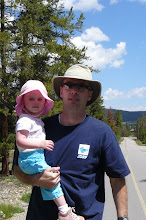Language, Part II
Wednesday, April 13, 2005 by niebuhrian
Language is one of the most important tools we have at our disposal. With it we can start and stop wars, we can love and hate, we can simplify and obfuscate. One important question concerning religious language continues to dog me: why is the language of systematic theologians generally less approachable than that of preachers?
Read the following three interpretive sentences of Luke 24:13-25.
This is a narrative whereby the unknown becomes the known through a proto-eucharistic meal rather than an evangelistic discourse and delineation of the offices of the Messiah.
Now try this sentence on for size.
This is a story concerning the post-resurrection beginnings of evangelistic dialogue contrasted with the efficacy of simply being present with one another through the sharing of a communion meal.
Finally, try this one.
This is a story about two people who knew how to talk about Jesus but had a hard time seeing him until they sat down to share a meal together.
Of these three sentences which is more meaningful to you? I don’t want to be accused of “syntaxism” but there is a great deal of difference between these three sentences that, for the most part, hold the same meaning.
Where would you expect to read each one of these sentences? Which one speaks to the soul, the heart, or the brains of this passage? What does each statement pull from you?
On the eve of my entrance into a doctoral program, questions of language are at the forefront of my thinking. Part of me is consumed with the creative and simple aspects of defining and describing the world I inhabit. The other part is fighting the arbitrary constraints of theological language and the general confusion and, dare I say, arrogance that it perpetuates.
There is a great deal of difference between reading Paul Tillich and Frederick Buechner, yet both are discussing theological aspects of life. How can I write like Buechner in a doctoral program? Tillich is wonderful and rich, but thick and sometimes obtuse and unexciting. How can I maintain the growth that has occurred in my life over the past year or two in the midst of an educational endeavor that desires some form of conformity in its process?
In the end, it comes down to this thought. I do not fear failure at the doctoral level. I fear success. I have worked hard to find, seek, and see the richness and beauty of life. I have toiled in front of my laptop, choosing words that describe my moods, my feelings, and my experiences. I fear that all of my hard work will be lost when I start this “higher education” program. I fear that I will lose these parts of me that have connected genuinely with those around me. The work and study of a doctoral program is daunting but doable. The work and study of life is precious and difficult, and without practice can be lost amidst toil and monotony of day-to-day activity.
grace and peace
Read the following three interpretive sentences of Luke 24:13-25.
This is a narrative whereby the unknown becomes the known through a proto-eucharistic meal rather than an evangelistic discourse and delineation of the offices of the Messiah.
Now try this sentence on for size.
This is a story concerning the post-resurrection beginnings of evangelistic dialogue contrasted with the efficacy of simply being present with one another through the sharing of a communion meal.
Finally, try this one.
This is a story about two people who knew how to talk about Jesus but had a hard time seeing him until they sat down to share a meal together.
Of these three sentences which is more meaningful to you? I don’t want to be accused of “syntaxism” but there is a great deal of difference between these three sentences that, for the most part, hold the same meaning.
Where would you expect to read each one of these sentences? Which one speaks to the soul, the heart, or the brains of this passage? What does each statement pull from you?
On the eve of my entrance into a doctoral program, questions of language are at the forefront of my thinking. Part of me is consumed with the creative and simple aspects of defining and describing the world I inhabit. The other part is fighting the arbitrary constraints of theological language and the general confusion and, dare I say, arrogance that it perpetuates.
There is a great deal of difference between reading Paul Tillich and Frederick Buechner, yet both are discussing theological aspects of life. How can I write like Buechner in a doctoral program? Tillich is wonderful and rich, but thick and sometimes obtuse and unexciting. How can I maintain the growth that has occurred in my life over the past year or two in the midst of an educational endeavor that desires some form of conformity in its process?
In the end, it comes down to this thought. I do not fear failure at the doctoral level. I fear success. I have worked hard to find, seek, and see the richness and beauty of life. I have toiled in front of my laptop, choosing words that describe my moods, my feelings, and my experiences. I fear that all of my hard work will be lost when I start this “higher education” program. I fear that I will lose these parts of me that have connected genuinely with those around me. The work and study of a doctoral program is daunting but doable. The work and study of life is precious and difficult, and without practice can be lost amidst toil and monotony of day-to-day activity.
grace and peace
